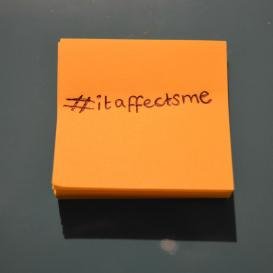The petition to make Mental Health Education compulsory in schools has been set up by teacher Laura Darrall in parallel with an internet selfie campaign under the hashtag #itaffectsme. The hashtag is intended to encourage those who have suffered from a mental health issue to post pictures on social media, removing the stigma and hoping to increase the visibility of mental health issues.
Mental Health Education
On the petition page Laura writes: ‘#itaffectsme wants to see Mental Health Education put on the National Curriculum. To arm our children with knowledge, understanding and compassion. 1 in 4 people suffer with mental illness and 50% of those are established by age 14. We teach our children symptoms of chlamydia and gonorrhoea so why not depression, OCD and anxiety?
‘As a teacher and I come across young people with mental health issues and anxieties regularly. If they were taught to talk about their feelings in the same way they might if they had a tummy ache, it would help remove the stigma that’s stayed attached to mental health for too long.’
Political landscape
Laura’s campaign for Mental Health Education is gaining momentum in the wake of David Cameron’s surprising decision last week to block the proposal for compulsory Sex Education in all schools. The proposal had the heft of numerous senior supporters, including Cameron’s Education Secretary Nicky Morgan, but was denied. One official offered the explanation: ‘It’s largely to do with this notion that if we start focusing on PSHE we’re moving away from the rigour agenda.’
The purpose of PSHE (Personal, Social, Health and Economic education) is to ensure all students are equipped with the knowledge and understanding to live safely, healthily and responsibly as individuals and within a community. Making Mental Health Education compulsory is designed to give students who may already be suffering support, and to combat the misunderstandings and stigmas of the classroom which can have a worsening effect on a child’s mental health.
Student welfare
Laura Darrall’s campaign does not stand alone in calling for an emphasis on student welfare within our education system. A similar petition closed 22 January 2016 with over 50,000 signatures and received a response from the Department of Education which avoided commenting on changing the curriculum, instead going into detail on the existing investments in mental health.
Many of the Department’s listed investments focus on help within families. In the way of education, they state: ‘It is important that schools should be free to develop approaches to supporting mental health that suit their particular circumstances’.
Is it likely to happen?
Alongside the failed attempt to introduce compulsory Sex Education, there seems to be a model of governmental reluctance to make real changes to the curriculum, instead leaving schools individually accountable. One of the Department of Education’s arguments is that teachers are not mental health professionals, and so are not equipped to carry out this work. It is unclear what the expectation is of teachers to use their initiative to engage with students on mental health without this professional training or the support of the curriculum.
Laura’s petition is directed at Nicky Morgan MP, who was framed as furious after PM David Cameron shut down the Sex Education policy. The petition needs only 5,000 more signatures to reach its goal of 50,000, but in the light of Morgan’s recent failed campaign in which she was supported by four parliamentary select committees, five teaching unions, the Children’s commissioner and the Chief Medical Officer, it’s questionable how seriously 50,000 public signatures will be taken by Cameron’s government.









